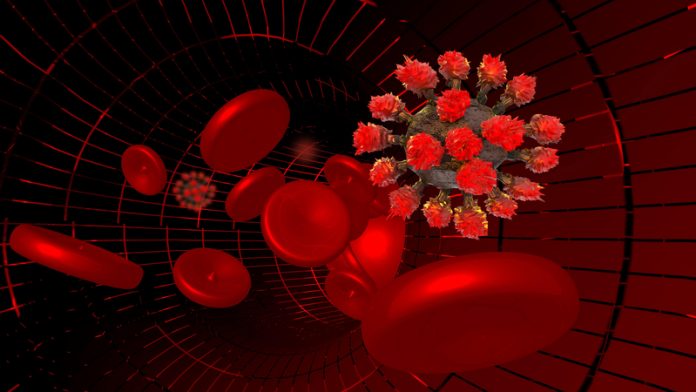People who have recovered from COVID-19 may be at risk of developing blood clots due to an overactive immune response, according to a new study
Scientists from Nanyang Technological University, Singapore (NTU), collected and analysed blood samples from 30 patients a month after they had recovered from COVID-19 to investigate the risk of blood clot formation.
The findings revealed that all patients had twice the normal number of circulating endothelial cells (CECs) that had been shed from damaged blood vessel walls, possibly from a lingering and overactive immune response, which may trigger the formation of blood clots.
In some cases, they are at increased risk of heart attack, stroke or organ failure when blood clots block major arteries to vital organs.
Immune cells
The researchers also found that the patients continued to produce high levels of cytokines – proteins produced by immune cells that activate the immune response against pathogens.
Unusually high numbers of immune cells, known as T cells, that attack and destroy viruses were also present in the blood of recovered patients.
The presence of both cytokines and higher levels of immune cells suggest that the immune systems of recovered patients remained activated even once the virus was gone.
The study’s first author Florence Chioh, a Research Assistant at NTU’s Lee Kong Chian School of Medicine, said: “While COVID-19 is mainly a respiratory infection, the virus may also attack the linings of blood vessels, causing inflammation and damage. Leakage from these damaged vessels triggers the formation of blood clots that may result in the sort of complications seen in the patients during hospitalisation.”
One of the co-authors of the paper, Professor Lisa Ng, Executive Director of A*STAR Infectious Diseases Labs and previously Senior Principal Investigator at SIgN, said: “We assessed the levels of immune mediators in these patients, which revealed several proinflammatory and activated T lymphocyte-associated cytokines sustained from infection to recovery phase. This correlated positively with CEC measure, implying cytokine-driven vessel damage. We found that COVID-19 patients with vascular complications have a higher frequency of T cells, which may in turn attack the blood vessels. Preventive therapy may be needed for these patients.”
Asst Prof Cheung added: “Those with cardiovascular conditions need to be more cautious since their underlying conditions already weaken their vascular systems. It’s a double blow with COVID-19. As we gain greater understanding of complications COVID ‘long-haulers’ face, there is hope to encourage vaccine take-up rate to protect oneself from both the virus and its long-term complications.”
The team, comprising researchers from NTU, Agency for Science, Technology and Research’s (A*STAR) Singapore Immunology Network (SIgN), and the National Centre of Infectious Diseases, Singapore (NCID), is now investigating the longer-term effects of COVID-19 in patients who have recovered from the infection for at least six months or longer.
The findings are published in the peer-reviewed scientific journal eLife.











